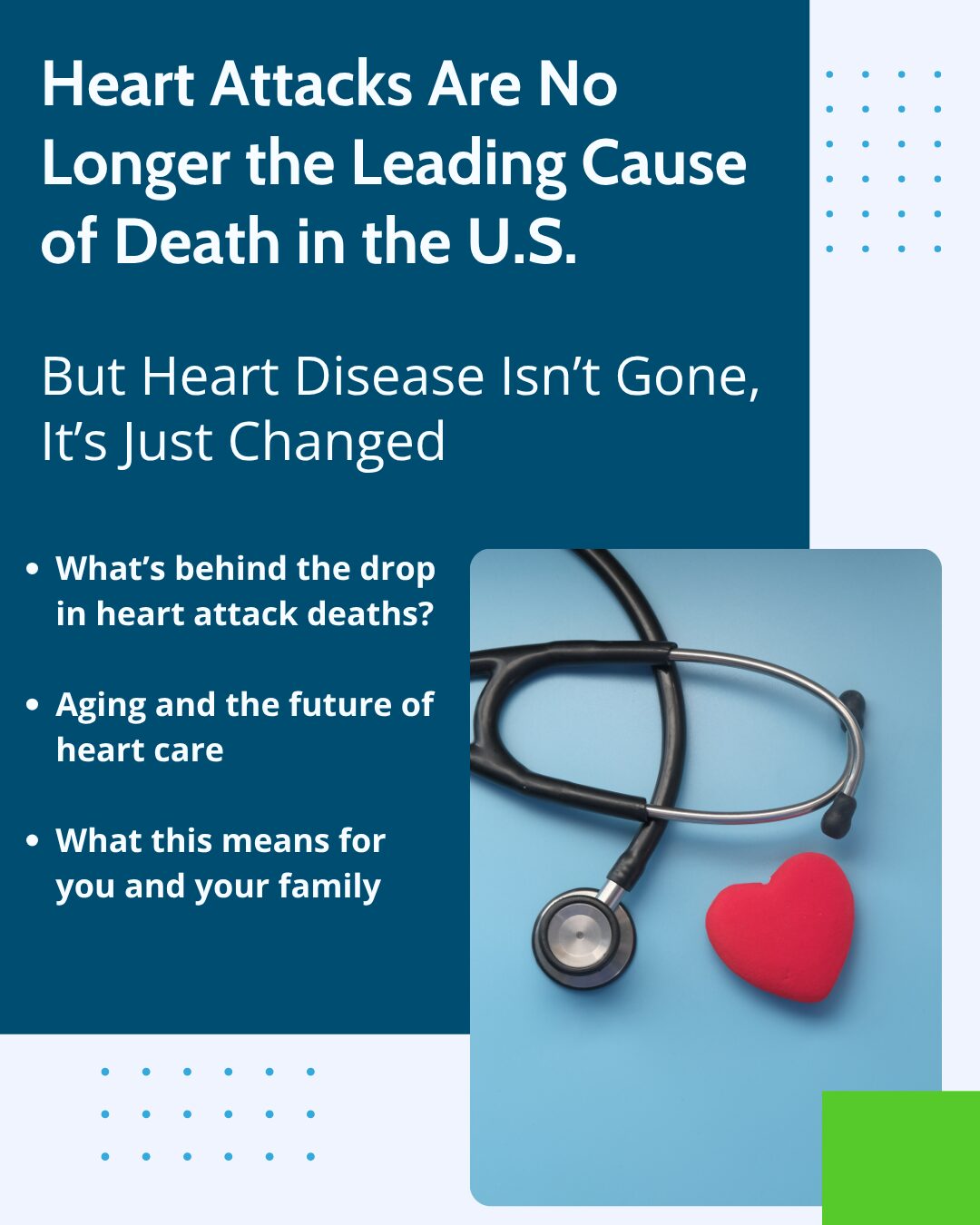Heart Attacks Are No Longer the Leading Cause of Death in the U.S. — Here’s Why That Matters for You
Over the last 50 years, the United States has seen a dramatic decline in deaths from heart attacks — an almost 90% drop since 1970. Thanks to advancements in medical treatments, lifestyle changes, and improved emergency response, heart attacks are no longer the most common cause of death. However, heart disease as a whole remains the leading killer, and it’s evolving in new ways that affect how we care for our hearts as we age.
What’s Behind the Drop in Heart Attack Deaths?
A team led by Sara King at Stanford University analyzed U.S. mortality data from 1970 to 2022 using the CDC’s national database. They found that:
In 1970, 41% of all deaths in the U.S. were from heart disease.
By 2022, that number had dropped to 24%, largely due to a sharp decline in fatal heart attacks.
This progress is thanks to:
- Medical breakthroughs such as coronary artery stents, bypass surgeries, and cholesterol-lowering medications (like statins).
- Better emergency care, including faster access to treatment and widespread bystander CPR training.
- Public health efforts to reduce smoking and promote heart-healthy living.
But Heart Disease Isn’t Gone — It’s Just Changed
While fewer people are dying from acute heart attacks, deaths from chronic heart conditions have sharply increased, likely because people are living longer and surviving initial heart events.
Between 1970 and 2022, the U.S. saw:
- A 146% rise in deaths from heart failure
- A 106% increase in deaths from arrhythmias
- A staggering 450% rise in deaths from hypertensive heart disease
“These are conditions that often develop over time,” says King. “People are living longer after heart attacks, but that gives chronic heart issues more time to develop.”
Aging and the Future of Heart Care
The shift in heart disease trends reflects a broader health challenge: How can we age more healthfully? With more people surviving major cardiac events, the focus must now shift to preventing and managing long-term heart conditions such as:
- High blood pressure
- Heart rhythm disorders
- Congestive heart failure
It also means addressing other lifestyle-related risks — like diabetes, obesity, inactivity, and high stress — earlier and more aggressively.
What This Means for You and Your Family
At Orléans Family Health Clinic, we believe prevention is the best medicine. Here’s how you can reduce your long-term heart risks:
- Know your numbers — Keep track of your blood pressure, cholesterol, and blood sugar.
- Eat heart-healthy — More fruits, vegetables, and fibre; less salt, sugar, and processed food.
- Move more — Aim for 150 minutes of moderate activity per week.
- Don’t smoke — And if you do, ask us about quit support programs.
- Manage stress — Chronic stress can raise blood pressure and strain the heart.
- Get regular checkups — Early detection of chronic heart issues can save lives.
The bottom line: While we’ve made remarkable progress in reducing heart attack deaths, heart disease is still very much with us — it just looks different than it did a generation ago. Together, let’s shift the focus to living longer and healthier, with hearts that stay strong through every decade of life.
Book your next heart health checkup today at Orléans Family Health Clinic. Your heart will thank you.
Disclaimer: The medical information on this site is provided as an information resource only and is not to be used or relied on for any diagnostic or treatment purposes. This information does not substitute for professional diagnosis and treatment. Please do not initiate, modify, or discontinue any treatment, medication, or supplement solely based on this information. Always seek the advice of your healthcare provider first. Full Disclaimer.

